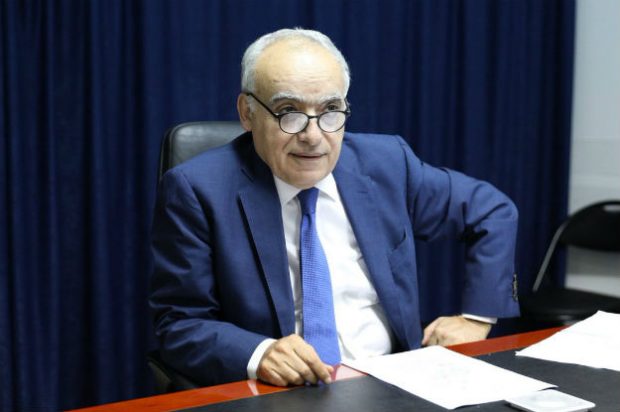UN delegate to Libya tells Security Council “The country lurching from emergencies as extremists grow”

The UN envoy for Libya said the country has lurched from one emergency to another in recent weeks and warned that the IS extremist group is expanding its operations and Libya could become a refuge for terrorist groups of all persuasions.
Ghassan Salame told the Security Council Wednesday that “the status quo in Libya is untenable.”
He urged council members to help address the “looming threat” from the spread of extremist groups, and support economic reforms and efforts to advance the political process and move toward national elections.
Salame said violence that consumed the capital starting Aug. 26 “shattered the facade of calm that had prevailed in Tripoli since May 2017.” Tanks and heavy artillery were deployed in residential neighborhoods leaving 61 Libyans dead and nearly 160 injured, many of them civilians including children, he said.
Tripoli was “on the brink of all-out war” until the U.N. brokered a fragile cease-fire between the major parties on Sept. 4 which it is now trying to help take root as a first step toward peace, he said.
“This crisis is but the latest in a series of crises that have engulfed Libya,” Salame stressed.
He pointed to events in Libya’s oil-rich crescent in June and July that “effectively threatened to split the country,” the Islamic State’s expanding presence and operations, and over 1,000 Chadian government and opposition forces fighting in recent weeks from bases in southern Libya.
This risks “the south becoming a regional battleground and safe haven for foreign armed groups,” he said.
Salame also pointed to hunger strikes in eastern and western Libya by refugees and asylum seekers in detention centers protesting their bleak living conditions.
On an upbeat note, he said, “In crisis lies the opportunity to tackle the underlying causes.”
“To restore stability to Libya there is a strong and urgent need to establish strong and unified civilian and military institutions which work for the benefit of all citizens,” Salame said.
Salame told the Security Council that “for national elections to take place a number of conditions must be met” which “will require great efforts to achieve — but they are achievable.”
He was highly critical of the House of Representatives which has failed to deliver on promised legislation for a referendum and elections.
“They simply have no intention of relinquishing their positions,” Salame said. “They have put in place legal provisions to maintain their authority in perpetuity. … And for the personal ambitions of a few, all Libyan citizens have paid a steep price.”
He said any rapprochement between the two legislative houses must be directed toward advancing the political process, “not to ensure their own longevity.”
“If legislation is not produced soon, we will close the chapter on this approach,” Salame warned.
“There are other ways to achieve peaceful political change, and we will embrace them with no hesitation, indeed with enthusiasm,” he said, without elaborating.
How to submit an Op-Ed: Libyan Express accepts opinion articles on a wide range of topics. Submissions may be sent to oped@libyanexpress.com. Please include ‘Op-Ed’ in the subject line.
- Libya’s HCS invites applicants for key state roles - December 31, 2023
- UK calls on Iran to prevent escalation in Israel-Hamas conflict - November 05, 2023
- Libyan Interior Minister: Immigrant shelter costs a fortune - November 05, 2023


